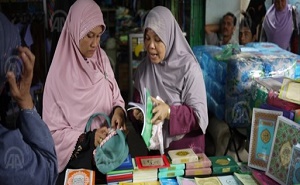Thailand: Muslim Pattani longs for peace, freedom in Thailand
 JAKARTA, Indonesia (AA): The Thai government last Sunday met a delegation of Muslim groups in southern Thailand to hear their aspirations amid ongoing violence in the region.
JAKARTA, Indonesia (AA): The Thai government last Sunday met a delegation of Muslim groups in southern Thailand to hear their aspirations amid ongoing violence in the region.
The Southern Thai Peace Delegation was led by Baba Abdulrahman, the chair of the Pattani Islamic Religious Council, while Wanlop Rugsanaoh was present as the head of the government delegation.
Muslim representatives asked the government to proclaim Friday, a holy day for Muslims, as a public holiday and for the Malay language to be declared as the official language of southern Pattani, Yala, Narathiwat and Songkhla provinces.
The four provinces have a large population of the Muslim Malay community, Pattani, with 1.4 million residents, according to government data.
Representatives also proposed those familiar with Islamic practices be put in charge of pilgrimage affairs, drafting Islamic laws for the provinces and the development of a halal industry.
Historical legitimacy
Teuku Zulkhairi, an Indonesian Islamic expert in Southeast Asia from Ar-Raniry State Islamic University, voiced appreciation for the meeting.
Zulkhairi told Anadolu Agency minority groups in the south are part of the Malay Muslim entity that has a strong and long history in southeast Asia.
He said they are not a new community in southern provinces and noted that Islam had entered the region in the 15th century, which led to the establishment of the Patani Darussalam Kingdom.
“The Pattani name came from al-Fatani in Arabic which means ‘intellectuals’ since there were many Muslim ulama [scholars] born there,” Zulkhairi said.
The PatPattanitani Darussalam Kingdom was then conquered by the Kingdom of Siam, the Thai ruler, in 1785. Siam took control of Patani’s entire territory and divided it into seven provinces.
Thai ruler, King Chulalongkorn, broke the peace treaty with the provinces in 1901 and launched a military campaign. It ended in 1909 with the Anglo-Siam treaty, which paved the way for the Kingdom to annex the southern Thailand region.
Freedom for Muslim minorities
Zulkhairi voiced the importance for the Thai government to provide freedom for Muslim minorities in carrying out religious teachings in language and an education curriculum.
He also called on the largest Muslim countries in southeast Asia — Indonesia and Malaysia — to encourage Thailand to protect the rights of the Patani Muslim minority.
Zulkhairi said if Muslims in southern Thailand can live in peace and enjoy freedom and justice, it will have a positive influence on Thailand’s image in international eyes.
“This is a challenge for the Thai government to show its commitment,” he said.
Human rights activist Mustopha Mansor from the Malaysian Civil Society Solidarity Association, which often provides humanitarian assistance in southern Thailand, has a similar view regarding Muslim minorities.
“The demands from Patani Muslim delegations were in accordance with the 1948 UN Universal Declaration of Human Rights,” Mansor said.
Based on the declaration, he said, Patani Muslim minorities have the right to express their opinion, choose their religion and beliefs and be free from fear.
Dialogue with insurgent group
Zahri Ishak, a Thai human rights activist from the NGO Bicara Patani, said it was the third time Wanlop visited the southern region to accommodate the aspirations of Patani Muslims.
“He was there to hear proposals or demands from various parties, it can be done at any time by the Thai government,” he told Anadolu Agency.
Ishak, however, reminded the peace negotiation team not to abandon the ongoing dialogue with the most influential insurgent group, Malay National Revolutionary Front (BRN), since it is a different entity that the Southern Thailand Peace Delegation.
Thailand officially launched a peace process with insurgent group Barisan Revolusi Nasional Melayu Patani (BRN) on Jan. 21 in Kuala Lumpur, Malaysia. The negotiations have been mediated by Malaysia.
“There is an impression that the Thai government wants to localize the Muslim minority case and make it remain as a domestic problem, not an international issue,” the activist said.
Meanwhile, Mansor said that since the administration of Malaysian former ruling party Pakatan Harapan collapsed, negotiations between BRN and Thailand were no longer as solid as they used to be.
In March, the two parties issued a joint statement agreeing to a cease-fire.
Do not let this be formality
Meanwhile, Marwan Ahmad, 29, a Muslim in Pattani province, voiced his wish that meetings between authorities and Muslim groups were not just a formality.
“Many Patani people don’t trust the Thai delegation’s peace negotiation team because currently there has been a wave of protests in Bangkok against the abuse of power by military junta government,” Ahmad said.
He said the government sees the conflict in the south as an ordinary riot, even though the conflict started since Patani was annexed in 1909.
“The government has to build trust and show a democratic behavior,” he said.
Thai government imposed martial law in three Muslim-majority provinces in southern Thailand — Pattani, Narathiwat, Yala — following deadly violence in 2004.
At least 7,040 residents have since been arrested by the military, while 4,928 have been released, according to Bicara Patani.
* Writing by Rhany Chairunissa Rufinaldo from Anadolu Agency’s Indonesian language services in Jakarta
[Archive Photo: Muslim villagers in Pattani,Yale, Thailand, April 2014. Photographer: Marcus Brogden/AA].
Suorce: http://muslimnews.co.uk/

